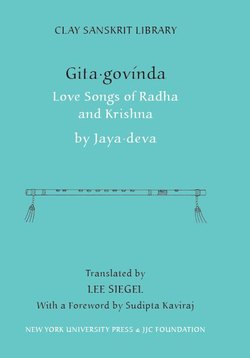Читать книгу Gita Govinda - Jayadeva - Страница 24
На сайте Литреса книга снята с продажи.
Оглавлениеimplicitly authoritative, version of the marvelous life of the poet as holy man. These chronicles constitute a religiously motivated and apologetic exegesis of his text in which the courtly love story is read as an allegory of spiritual relationship with Krishna as the Lord of the Universe.
In most versions, including those that I myself have heard over the years in Puri, Jaya·deva had, as a young man in Kenduli village, Orissa, consecrated his life to the service of Krishna by becoming an homeless sadhu, taking a vow of chastity, and singing hymns of praise to Krishna as he wandered. Pleased with the sweetness of his songs, Krishna, according to the legends, arranged a marriage between his devotee and a beautiful dancer named Padmavati. When Jaya·deva would sing for Krishna in his form as Lord Jagan· nath, installed in the great temple of Puri, Padmavati would dance. It was only to obey Krishna that Jaya·deva broke his vow of chastity to marry Padmavati and become a householder. And likewise, it was only to serve Krishna that Padmavati agreed to that marriage. The legends about Padmavati, as both the wife of Jaya·deva and a devadasi in the Jagannath Temple, reconcile two modes of bhakti—the dutiful, dispassionate domestic devotion of a wife to her husband, and the impassioned, ecstatic religious devotion of any person, man or woman, to Krishna.
The textual justification of these stories is to be found in two references in the “Gita·govinda” to a Padmavati. At the very beginning of the work, in introducing himself to his audience, the poet proclaims his veneration of Padmavati. King Mananka glosses the name as “Lakshmi,” the heavenly consort of Vishnu and goddess of Prosperity. Jaya·deva is, ________
